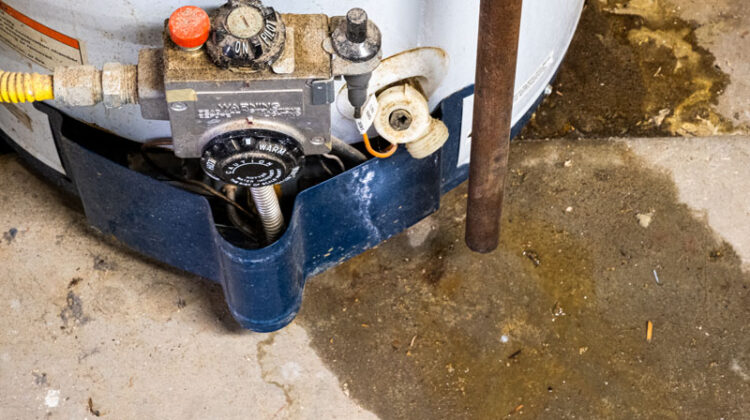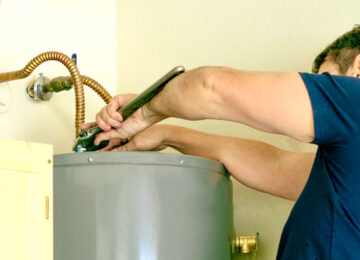If your water heater is leaking, you must act right away. A leaking water heater may appear to be a minor problem at first, but it can quickly develop into a major issue. The typical water heater has a 50-gallon tank and will rapidly refILL it with cold water when returning or leaking from the tank. Even a little amount of leaked water from your heater can cause damage to your floors, sub-floors, and walls. Damage caused by a large flood might lead to significant repair expenses as well as personal property damage.
Fortunately, there are a few things you can do to slow or stop a leaking water heater. Before beginning any plumbing repairs in your home, make sure the electricity is shut off at the breaker box. Once the power has been shut down, you can proceed with your work.
One effective method of stopping a leaky water heater is by tightening the plumbing connections at both ends of its supply and return lines. If your unit is newer than five years old and has plastic plumbing pipes, you should be able to get by just using adjustable pliers on the band clamps that hold these tubes together. This may cause some of the metal crimp rings inside these clamps to loosen up and fall out of their grooves, so it’s best to replace them after you’ve tightened your plumbing connections.
For older plumbing systems with metal plumbing lines, you will need a pipe wrench to tighten the plumbing fittings at both ends of your supply and return plumbing tubes. However, if these plumbing lines are corroded or rusty at all, it’s safest to replace them entirely before tightening any fittings. After tightening your plumbing connections, turn on the water supply to your heating system and look for new leaks. If they are still leaking from the area where they came into contact with the heating unit – which is usually near its top-most portion – then tighten each connection two more times just in case you didn’t get them tight enough the first time around.
Once you have tightened all plumbing connections and still cannot stop your water heater from leaking, it may be time to replace the heater. Most plumbing supply stores sell models that are compatible with your existing plumbing lines. A new 50-gallon water heater will usually cost between $150 and $200, plus the installation costs of hiring a plumbing technician or electrician.
It is always possible that your water heater is simply reaching the end of its life span, especially if you are noticing either minor leaks along the plumbing connections or rust stains under the bottom of the unit itself. If you find yourself in this situation, consider contacting a professional plumbing technician who specializes in replacing hot water heaters to get an estimate on how much replacement will cost before committing to the purchase.
For plumbing systems that are more than 15 years old, the plumbing lines leading up to your water heater may be obsolete or otherwise incompatible with modern plumbing system components. If this is the case, you should consider having your entire plumbing system updated so it can accommodate a new hot water heater. However, this will typically cost significantly more than simply purchasing and installing a new unit yourself. Therefore, if money is tight and you don’t think you can afford to update your plumbing system as well as purchase and install a new heating unit, then at least call in a plumbing technician who specializes in fixing leaking water heaters for an estimate on replacing just the specific parts of your existing water heater that seem worn out or compromised by corrosion and debris buildup.
Note: This article was written for plumbing technicians in mind, so it can be difficult to understand if you are not familiar with plumbing. For non-plumbing people who own a water heater, here is my best attempt at translating the above paragraph into plain English:
- Turn off the power to your hot water heater at your circuit breaker box.
- You can tighten each plumbing connection on your hot water tank by using adjustable pliers or a pipe wrench. If the plumbing lines are corroded or rusty, it’s safest to replace them entirely before tightening any fittings.
- After tightening all of the plumbing connections and still cannot stop your water heater from leaking, it may be time to replace the unit altogether.
- If your plumbing system is more than 15 years old, consider having your plumbing system updated to accommodate a new hot water heater instead of just purchasing and installing a new unit if you don’t think that you can afford to update the plumbing system as well as purchase and install a new heating unit.
Leaks can also occur at the plumbing joints themselves, most commonly at the hot water inlet. You can replace most easily accessible plumbing line connections with compression fittings if this is the cause of your leaky water heater. They are simple to install and don’t require tools like wrenches or pliers for connection purposes.
The plumbing valves on your unit might not be turned completely off if there isn’t any hot water entering them, causing these valves to drip due to thermal expansion inside their plumbing lines. To check for this problem, turn on the gas valve ensuring that no hot water enters it (you will know because it won’t get very warm) and then see if it continues to drip after a few minutes have passed If so, you need to turn off the gas valve and replace the plumbing valves on your tank.
Last, but not least, if you find that none of these tactics is working to stop your water heater from leaking, then it might be time to consider replacing it entirely. If you are tiring of plumbing repairs for this unit, then buying a new one may well end up costing you less in plumbing repair fees over the long run.
Speak With A Water Heater Repair Pro at Laureyn’s United Today!



